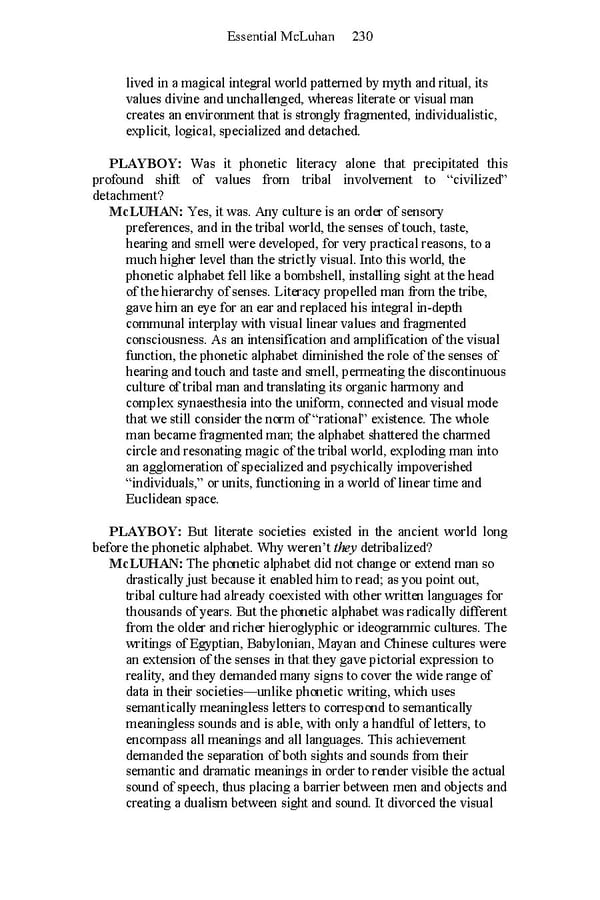Essential McLuhan 230 lived in a magical integral world patterned by myth and ritual, its values divine and unchallenged, whereas literate or visual man creates an environment that is strongly fragmented, individualistic, explicit, logical, specialized and detached. PLAYBOY: Was it phonetic literacy alone that precipitated this profound shift of values from tribal involvement to “civilized” detachment? McLUHAN: Yes, it was. Any culture is an order of sensory preferences, and in the tribal world, the senses of touch, taste, hearing and smell were developed, for very practical reasons, to a much higher level than the strictly visual. Into this world, the phonetic alphabet fell like a bombshell, installing sight at the head of the hierarchy of senses. Literacy propelled man from the tribe, gave him an eye for an ear and replaced his integral in-depth communal interplay with visual linear values and fragmented consciousness. As an intensification and amplification of the visual function, the phonetic alphabet diminished the role of the senses of hearing and touch and taste and smell, permeating the discontinuous culture of tribal man and translating its organic harmony and complex synaesthesia into the uniform, connected and visual mode that we still consider the norm of “rational” existence. The whole man became fragmented man; the alphabet shattered the charmed circle and resonating magic of the tribal world, exploding man into an agglomeration of specialized and psychically impoverished “individuals,” or units, functioning in a world of linear time and Euclidean space. PLAYBOY: But literate societies existed in the ancient world long before the phonetic alphabet. Why weren’t they detribalized? McLUHAN: The phonetic alphabet did not change or extend man so drastically just because it enabled him to read; as you point out, tribal culture had already coexisted with other written languages for thousands of years. But the phonetic alphabet was radically different from the older and richer hieroglyphic or ideogrammic cultures. The writings of Egyptian, Babylonian, Mayan and Chinese cultures were an extension of the senses in that they gave pictorial expression to reality, and they demanded many signs to cover the wide range of data in their societies—unlike phonetic writing, which uses semantically meaningless letters to correspond to semantically meaningless sounds and is able, with only a handful of letters, to encompass all meanings and all languages. This achievement demanded the separation of both sights and sounds from their semantic and dramatic meanings in order to render visible the actual sound of speech, thus placing a barrier between men and objects and creating a dualism between sight and sound. It divorced the visual
 Essential McLuhan Page 236 Page 238
Essential McLuhan Page 236 Page 238